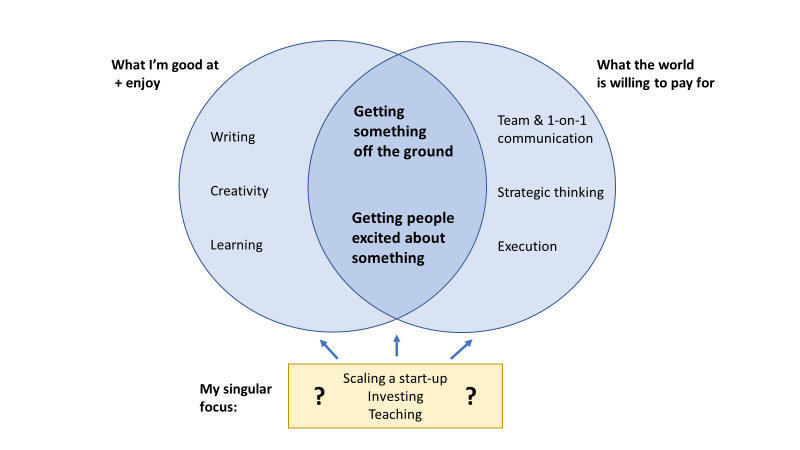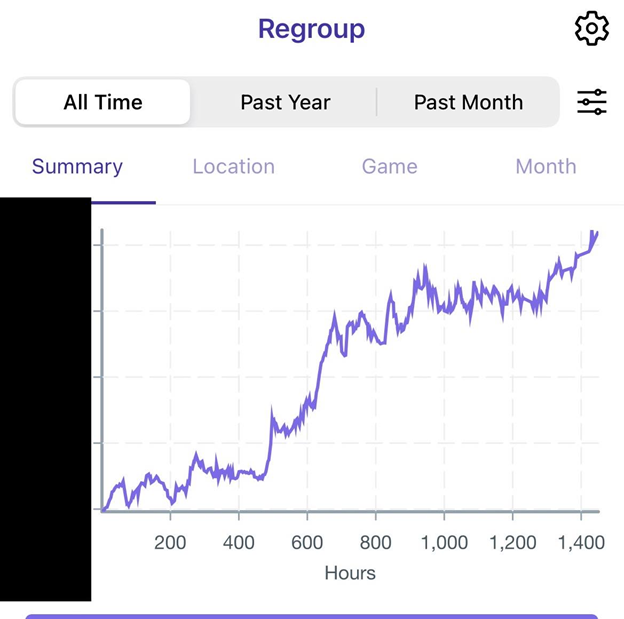Once upon a time at a dinner party, Bill Gates and Warren Buffett were asked to write on a napkin, the single most important driver of their success.
They thought for a moment, wrote their answers separately, and revealed their response simultaneously.
“Focus” was the word on both napkins.
Fantastic. The secret is out. Time to go home, focus, and become a billionaire!
If only it were that easy.
Personally, I’m less challenged by the question of how to focus, but rather, the question of what to focus on.
A framework I’ve found helpful is thinking about the intersection of:
- What I’m good at & I enjoy, and
- What the world is willing to pay for.
I first tried a version of this 3 years ago. I’ve since heard of this referred to as Ikigai / Purpose Venn Diagrams. And here is my latest, simplified version:

As you can see, there are still a few question marks. To clarify things, I’ve learned to seek effective criticism.
Effective critics are rare
When we tell people what we are doing, they usually say something along the lines of: “Oh that’s awesome! Good for you, keep me updated!”
After all, you might become the next Warren Buffett or Bill Gates. There is little incentive for the average person to share anything negative.
If you are lucky, your cheerleaders might even get a bit more specific: “I think what you’re doing is really cool because of X, Y, and Z…”
These words of encouragement are great at providing energy, but it’s easy to delude yourself.
We need both cheerleaders and critics in our lives.
Effective critics are rare. And because of that, you should cherish them, even when their opinions are not easy to hear.
Below is a short list of the most thought-provoking effective criticism I’ve received in recent months — from professional coaches and some of my closest friends.
Specific critiques I’ve received
#1 You need to focus on one thing
I’ve been told to focus repeatedly — by knowledgeable, experienced, and entrepreneurial mentors and friends who know me well and whom I trust.
Hell, I just finished a book written by a much wiser entrepreneur than I:
“When you are mid-journey with multiple projects that could potentially be “the one,” your instinct is to keep them all afloat. Pursuing a few paths in parallel keeps your options open, and it feels safe.
But it’s not. The flaw with pursuing and preserving many options is that doing so stunts your progress in any particular direction. When your energy is split, so is your speed and focus, and the resources around you are harder to tap when your narrative is too broad … Instead of your friends and professional network all spreading the word about the single thing you hope to achieve, they will be sending different messages.
But the greatest cost of trying to sustain multiple initiatives is having too little thrust behind one goal. When a goal is simple and singular, every realization builds upon the one before it. By having only one problem to crack over an extended period of time, your brain enters a state of deep crunching that is just not possible with too many projects and problems under way. When you’re all-in on one project or approach, you have a better chance of reaching escape velocity.”
Scott Belsky, “The Messy Middle. Chapter: Kill your Darlings”
Scott and others are telling us that:
- Time cannot be divided the same way money can.
- The act of focusing creates a self-fulfilling prophecy and truly outsized success
Despite how important I know focus is, I’m not ready to narrow in on one thing just yet.
In my past, I’ve jumped too quickly into new jobs and new projects. And as I grow older, I’m learning to be more selective.
#2 You need to think more about your time
Given my upbringing, fiscal frugality comes naturally. But until late last year, I didn’t truly view time as money.
I’ve long been nonchalant with my time for a few reasons:
- I was younger than I am now.
- I’m a big fan of serendipity.
- I see everything as a learning opportunity.
But recently, my attitude toward time has evolved.
Alongside focus, time is crucial. There are far too many things in the world to learn. We have to be deliberate with our time. It is the most precious and finite resource of all.
#3 You need to think outside of yourself
Like most people, I gravitate toward what I enjoy doing and what I’m good at.
That’s one approach — more inward facing, and it comes naturally to us
The other approach is more outward-facing, and it takes us more effort to think about.
And to succeed, we need to balance both approaches.
| What comes naturally to us | What takes us more effort to think about |
| Inside view | Outside view |
| Optimism | Conservatism |
| Oneself | Competition |
| Outlier | Base rate |
| Strengths | Weaknesses |
#4 Your way of learning isn’t optimal
This criticism from a trusted friend struck me hard.
I’ve always thought of myself as a reasonably quick learner.
I’ve received enough bad advice in life to have developed a natural wariness of it.
So I primarily learn by doing.
This approach has gotten me to where I am today, and it will get me decently further in life. After all, it’s better to start with a blank slate rather than a wrong framework.
But I’ve realized that practice alone is not the optimal way to learn. There actually is a way to speed up the learning process.
At a high level, I need to get over my wariness of learning from others. Simultaneously, I need to get great at discarding old learnings as context changes and contrary evidence emerges. One great resource that has helped refine my perspective here is Cedric Chin’s Common Cog.
Concluding thoughts on improving my emotional intelligence
I’m neither a Bill Gates nor a Warren Buffett, and I do not aspire to be them — or anyone else.
Over the years, I’ve become more comfortable with who I am. And I’ve also become more in tune with as well as comfortable expressing my feelings. My maturity is still a work in progress, but I’ve gotten better at seeking help.
Much of these learnings resulted from me being vulnerable and asking my friends for advice. I’ve also worked with several executive coaches, who function very much like therapists.
One emotion that I’m learning to manage is fear — fear of failure and disappointment.
The other emotion is envy — the cause of one of my biggest mistakes.
I don’t think I can ever fully eliminate fear. Nor can I fully eliminate envy. These are fundamental human tendencies. And I must accept them and learn to not let them affect my decision-making.
Despite the occasional feelings of fear and envy. I do think I am pretty happy. However, if you’ve read this far, you can tell that I’m certainly not satisfied.
Sounds like a paradox. But maybe not …
I actually hope I’ll never be satisfied until the very end of my life. Dissatisfaction is what keeps me going.
So here’s my mantra: “Always happy, never satisfied.”
If that resonates with you – let me help you figure out your path by showing you my own.
I’ve worked unbelievably hard at this. And I can tell you that it’s still not easy.
But I think I’m getting better at this — managing my emotions, seeking feedback, filtering critique, finding happiness — all of it.
Hopefully, my learnings can spare you some stress.
- I write public essays like this one.
- I send a private monthly newsletter detailing my career journey in real time.
- I offer one-on-one coaching for free, but only for a select group.
- My next goal is to build a community of like-minded people who are not only invested in their own personal growth but are also willing to help one another.
So if any of this resonates with you, go ahead and subscribe today — it’s completely free!
This is the final part of a 4-part series. For more context, read part 1: Learning to explore, part 2: Entrepreneurial reflections via exploration, and part 3: New career announcement! Finding structure through serendipity



